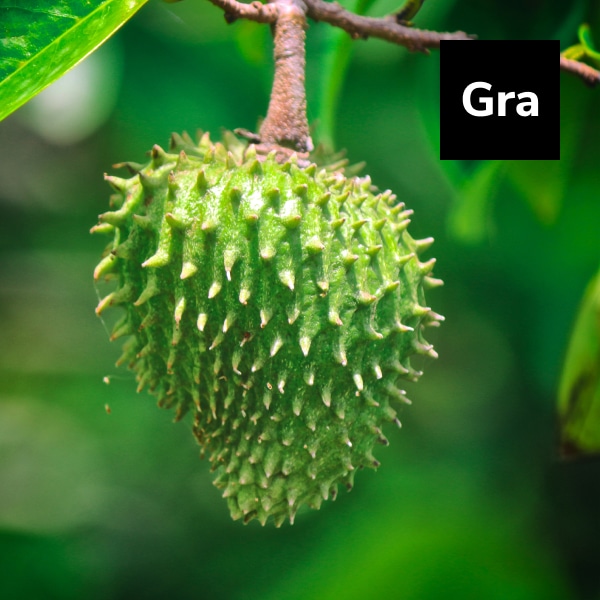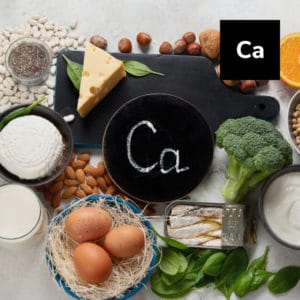Overview
Graviola (Annona muricata), commonly known as soursop, guanabana, paw-paw, and sirsak, is a member of the Annonacea family, often known as the custard apple family. Graviola fruits grow on trees and are big and oval, with a flavor that is similar to a hybrid between mango and pineapple.
It is native to tropical parts of Central and South America, as well as the Caribbean. Despite a lack of solid proof, indigenous societies revere graviola as a cure-all for inflammatory diseases such as arthritis, sleeplessness, cystitis, parasite infections, and cancer.
Key Benefits
- High in vitamin C
- It has powerful antioxidant and anti-inflammatory properties.
History of Usage
For thousands of years, local communities in Africa and South America have utilized graviola’s bark, leaves, roots, fruit, seeds, and flowers to cure anything from arthritis to liver issues, as well as bacterial and fungal diseases.
The graviola fruit has anti-inflammatory properties, made up of an edible white pulp and an indigestible black seed core.
The flesh has a custard-like texture and is sweet, juicy, tangy, and aromatic. It is also used in the production of jam, ice cream, fruit cocktails, and nectar. Sweet pulp can also be utilized to flavor sweets, sorbets, and ice cream. Capsules, liquid extracts, juice mixes, teas, and tinctures are examples of supplemental forms.
Biochemistry
Graviola extracts produced from various plant sections have been shown to have over 212 phytochemical components. Graviola’s primary anticancer, antioxidant, anti-inflammatory, antibacterial, and other health effects are attributed to several classes of annonaceous acetogenins (metabolites and products of the polyketide pathway), alkaloids, flavonoids, sterols, and others.
The 83 alkaloids identified from the Annona genus are structurally diverse and have pharmacological effects. This genus’ isolated alkaloids, including liriodenine, anonaine, and asimilobine, were shown to be anti-Staphylococcus epidermidis. Other alkaloids, such as (+)-Xylopine and isocoreximine, have shown anticancer efficacy against A549 and K-562 cell lines.
Graviola extracts contain antioxidant, anti-inflammatory, analgesic, antidiabetic, antiulcer, antibacterial, and antiviral properties, according to preclinical research. Extracts produced from leaves, fruits, and seeds have been shown to be effective in the treatment of breast, lung, colon, prostate, pancreatic, liver, and skin cancer. However, there is a scarcity of solid evidence.
Recent Trends
In 2021, the global Graviola market was valued at $150 million. It is expected to achieve a valuation of $350 million by 2026, with an annual growth rate of 11% between 2021 and 2026.
Graviola’s global market growth is influenced by factors such as the demand for fruit beer, ice cream, mousse, sorbet, custard, and sweet drinks. Graviola’s market is also expanding because of its purported capacity to treat cancer, depression, high blood pressure, and stress, as well as its prospective ability to combat bacterial and fungal infections.
Precautions
- Graviola should not be used by pregnant women, breast-feeding mothers, or youngsters.
- Graviola should not be used by those who have Parkinson’s disease. (See # 5 for further information.)
- Graviola should be avoided by those who have liver illness, neurological diseases, blood problems, or peptic ulcers.
- Graviola should be avoided by those who use blood thinners, NSAIDS, or anti-diabetic or hypertension medicines.
- Graviola is advised to be avoided by certain health professionals owing to the potential for neurological adverse effects.
References
- Rady I, Bloch MB, Chamcheu RN, Banang Mbeumi S, Anwar MR, Mohamed H, Babatunde AS, Kuiate JR, Noubissi FK, El Sayed KA, Whitfield GK, Chamcheu JC. Anticancer Properties of Graviola (Annona muricata): A Comprehensive Mechanistic Review. Oxid Med Cell Longev. 2018 Jul 30;2018:1826170. doi: 10.1155/2018/1826170. PMID: 30151067; PMCID: PMC6091294.
- Prabhakaran K, Ramasamy G, Doraisamy U, Mannu J, K R, Murugesan JR. Polyketide Natural Products, Acetogenins from Graviola (Annona muricata L), its Biochemical, Cytotoxic Activity and Various Analyses Through Computational and Bio-Programming Methods. Curr Pharm Des. 2016;22(34):5204-5210. doi: 10.2174/1381612822666160531163144. PMID: 27262333.
- Moghadamtousi SZ, Fadaeinasab M, Nikzad S, Mohan G, Ali HM, Kadir HA. Annona muricata (Annonaceae): A Review of Its Traditional Uses, Isolated Acetogenins and Biological Activities. Int J Mol Sci. 2015 Jul 10;16(7):15625-58. doi: 10.3390/ijms160715625. PMID: 26184167; PMCID: PMC4519917.
- Nugraha AS, Damayanti YD, Wangchuk P, Keller PA. Anti-Infective and Anti-Cancer Properties of the Annona Species: Their Ethnomedicinal Uses, Alkaloid Diversity, and Pharmacological Activities. Molecules. 2019 Dec 3;24(23):4419. doi: 10.3390/molecules24234419. PMID: 31816948; PMCID: PMC6930583.
- Caparros-Lefebvre D, Elbaz A. Possible relation of atypical parkinsonism in the French West Indies with consumption of tropical plants: a case-control study. Caribbean Parkinsonism Study Group. Lancet. 1999 Jul 24;354(9175):281-6. doi: 10.1016/s0140-6736(98)10166-6. PMID: 10440304.
- Eugenie Spiguel, MSN, ANP-BC, and Jyothirmal Gubili, MS. Graviola, Oct. 10, Integrative Oncology, 2019https://ascopost.com/issues/october-10-2019/graviola/




